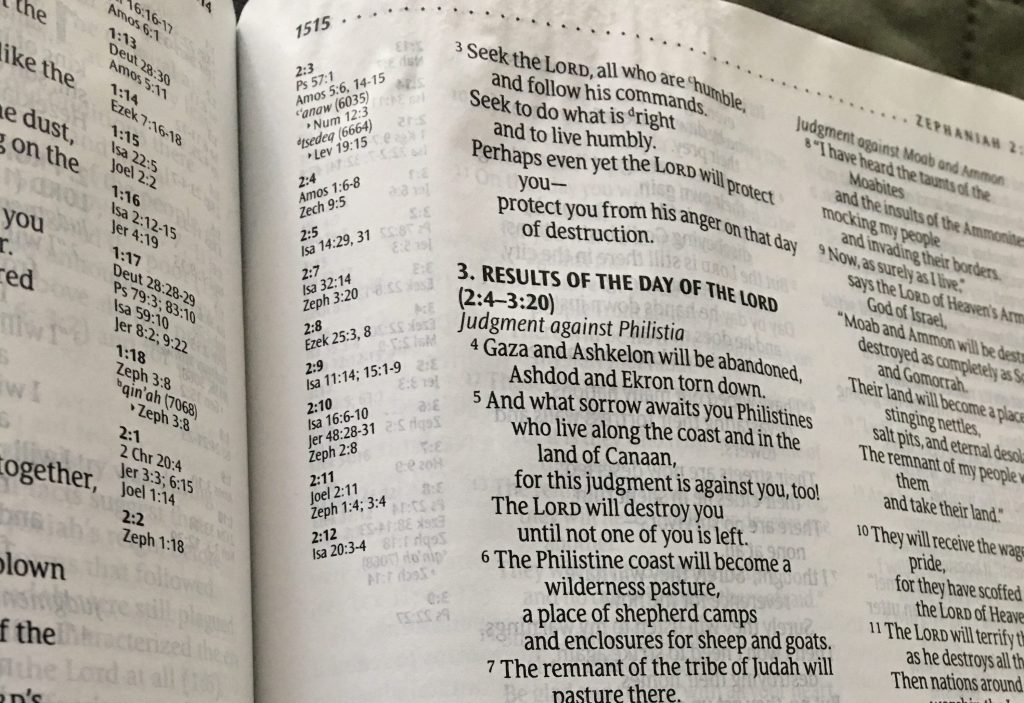I have heard many people say that they don’t like to study the Bible because they don’t understand or because it can be confusing. I believe part of the reason why people struggle with Bible study is because no one taught them the basics. Just like the fundamentals of a sport, studying the Bible has a few fundamentals we should practice. Here are 7 of them that we should all use.
7. GATHER THE NECESSARY BACKGROUND INFORMATION
Before even opening the book that you want to study, take the time to lookup some background information. In fact, those of us who are type-A can even make a study sheet to record the pertinent information. Here are some examples of information that needs to be gathered.
Author(s): Who was the author? Where and when did they write from? What do we know about the author?
Audience: Who is the audience? Are they primarily Jew? Gentiles? Mixed? Is the writing to a small group like a church? Or to a whole nation?
Date written: Approximate date(s) of writing. What was happening during the time of writing?
Purpose for writing: Why was the book authored? Was there a specific issue that needed addressed?
Geographical location: Where was the author when it was written? Where was the audience? Was the book/letter circulated?
Wider Genre: What type of writing was it? Letter? Prophecy? History?
Narrow Genre: Is the chosen passage a parable? A lecture? A vision? Each section of scripture can be divided by genre.
6. READ THE ENTIRE SECTION BEFORE LOOKING INTO THE DETAILS
For many of the New Testament (NT) books, the entire book can be read in under a 1/2 hour. If the book is skimmed beforehand then the reader can gather an over-all idea of what the book is about. The reader also gets a sense of any repeated points or patterns in the book. For the longer books like Revelation or the major prophets, they can be broken up into sections. Most study Bibles already have outlines that can assist in this matter.
The main reason why it’s important to read the larger portions before getting into the details is that we don’t get the context by just reading a few verses. For example, in Acts 21:25, Paul and the Jews of Jerusalem have a clash and the Jews explain to Paul that they have already sent a letter to the Gentile believers to help them interact with the Jews without causing disruptions. However, without reading acts 15, the Bible student would not know which letter they were referring to or why the letter came to exist in the first place.
Reading smalls sections only leaves out the context that is needed to understand the passage at hand.
5. MAKE OBSERVATIONS
The observations are best used when written down while reading the larger context of the passage (step #6). Some observations are more helpful than others but it is best to write them all down and then they can be weeded through later for importance.
Some examples of observations to write down are the following:
- Repetitions
- does the author repeated certain words or phrases?
- Contrasts and comparisons
- Sometimes an author will use something else as an example and compare it to a present day issue. It’s important to know if the author is making a positive connection or a negative connection.
- Are people from the OT being compared to anyone in the NT? Vice versa?
- Idioms (figures of speech)
- Idioms develop in every culture. It’s important to know if a phrase is an idiom or if it’s a literal statement.
- Modern idioms include things like “is the refrigerating running?” Refrigerators don’t “run” but the word has become known to mean something is operating. Another one would be saying that something “costs an arm and a leg”.
- An example of a biblical idiom would be “a closed hand” which means selfish or unwilling to give. Another would be “remove the foreskin of your heart” in Jeremiah 4:4.
- Cause and effect
- Paul and the prophets are well known for saying things like “because of XYZ, God is doing ABC”. It is critically important to understand that when God interacts with mankind that there is a cause and effect to all decisions.
- Likewise, the consequences of our own salvation has it’s own cause and effect. Paul uses this cause and effect phrasing often. Because we are now freed from sin, no longer are we a slave to our desires.
- Hyperbole
- Hyperbole is a form of speech often used by Jesus. It can sometimes fuse with an idiom as well. One example of a hyperbolic phrase would be when Jesus says “And if your eye causes you to stumble, gouge it out and throw it away” (Matthew 18:9)
- Hyperbolic speech is meant to capture one’s attention in order to make a wider point. It is not meant to be taken literally. The wider point of Jesus’ phrase in Matthew 18:9 is that sin will lead to death and eternal torment.
- Tone
- The tone of a person’s speech is incredibly hard to gather from a written text. However, it’s important to know if the words being uttered are in anger or out of concern. The age old expression is true that sometimes it’s not what you say but how you say it. The same is true for the scriptures.
- Structural forms
- Working at observing structural forms can be hard for a novice. Even trained theologians can overlook them at times. One of the most popular structures in the Hebrew style of writing is a chiasm. A chiasm is a paragraph the is formed specifically to point to a central point.
- The basic form of a chiasm is setup as ABC-X-CBA. The paragraph will lead into the central point and then reverse out making the same points as were laid out in the entry. Sometimes the main point will be doubled: ABC-XX-CBA.
- One example of a chiasm can be found in Matthew 6:24.
- No one can server two masters (A)
- for he will either hate the one (B)
- and love the other (X)
- of he will be devoted to one (X)
- and despise the other (B)
- for he will either hate the one (B)
- You cannot serve both God and wealth (A)
- No one can server two masters (A)
- Another structural form is a parallel. Parallels are very common in Hebrew poetry. They are abundant in the proverbs and psalms. The basic structure of a parallel is AABB or ABAB. They can be shorter as well, having just an AA or AB structure.
- Names, places, and temporal and geographical information
- While this is the last item on the list, it might be the most important. The names of places and people are critical to understanding the passage at hand, as well as references to time and location. This point needs no explanation. While reading the chosen book and then passage, record all instances of dates, places, and people.
- In some books like Acts, these items move around throughout the book. Without recording and keeping track of this information the reader can become lost in the movement of the book.
4. INVEST IN A GOOD BIBLE DICTIONARY
There are dozens of cheap but well-trusted Bible dictionaries on the market. Some can even be used for free on sites like blueletterbible.org. Others can be obtained in your local Christian book store or just about any shop in the web. Here are a few items that have been used and trusted for quite some time.
Cheaper dictionaries for the general public
- Easton’s Bible Dictionary
- International Standard Bible Encyclopedia
- Smith’s Bible Dictionary
- Eerdmans Dictionary of the Bible
- Baker’s Evangelical Dictionary of Biblical Theology
- Hitchcock’s Bible Names Dictionary
- Harper Collins Bible Dictionary
More expensive scholarly dictionaries
- Anchor Yale Bible Dictionary set (6 vol)
- The IVP Bible Dictionary Series (7 vol)
- Theological Dictionary of the Old Testament / New Testament
- Lexham Bible Dictionary
Bible dictionaries may not be great bathroom reading (unless you’re a nerd like me) but they are a great resource for looking up information. As humans we tend to forget things. Dictionaries do not tend to forget things. When doing your Bible study preparations lookup all the names and places once you’ve compiled a list.
3. ELICIT MULTIPLE OPINIONS
Opinions on the Bible usually come from two sources. The first is your own friends or study group. The second is a good commentary.
Friends
Studying the Bible on your own is good. However, one person can only catch so much. When multiple people study a passage everyone will notice different things about the passage. This is why Bible study groups are so helpful. Even a trained Bible student will miss things here and there. Having multiple people to study with will also endure that multiple interpretations are present.
When we read the Bible we read into the scriptures our own assumptions and ideas of how things were. Having lots of input will help to filter out some of our assumptions about the passage and hopefully develop a better understanding of the passage.
Commentaries
If you cannot garner options readily from friends or group mates, then you should invest in some commentaries. Commentaries are usually written by Bible scholars or sometimes even by pastors. My personal recommendation is to always get the ones written by scholars. Your pastor’s commentary comes every Sunday during the sermons.
Commentaries (like dictionaries) can often be read online for free. For the average Bible student the commentaries on Blueletterbible or biblestudytools would be good enough to help them along. I should offer one warning, however. Many of the free commentaries in the open domain are hundreds of years old. Christian scholars have learned much since they were written and some pieces of information are no longer valid. This is mostly true of linguistic and translation commentary. Therefore, it would be helpful to invest in at least one updated commentary set or at least borrow one from your pastor.
My personal recommendation for an easy to read commentary is to checkout the new Zondervan sets and individual volumes. They are very up to date and they are written for the average person. However, they were written by some of the best scholars of today.
2. USE THE FREE CROSS-REFERENCE TOOL IN YOUR BIBLE SPINE
Most Bibles today have a small column in the middle of the spine called a cross-reference. The cross reference is a simple tool that help to connect related passages together. It’s especially helpful when the NT quotes from the OT without actually citing the the source. For those who are not well versed in the OT, these references will be the best guide for understanding the NT.
There is an old saying that says, let the Bible interpret the Bible. It might sound funny but the basic idea it that the Bible covers a lot of things more than once. When Paul talks about specific items in the law of Moses, the hand cross reference will tell us where that item is located.
The cross reference also connects things like the story line of Acts to the letters Paul wrote. This helps to identify where Paul was when he wrote some of the NT epistles. It will also help to understand the context of the of the epistles and why they were written.
1. INCLUDE THE HOLY SPIRIT
It can be hard to explain the importance of the Holy Spirit in our study habits but it’s quite important. After all, it was the Holy Spirit that was credited with revealing that salvation was also for the gentiles.
God, who knows the heart, showed that he accepted them by giving the Holy Spirit to them, just as he did to us. 9 He did not discriminate between us and them, for he purified their hearts by faith. (Acts 15:8)
Moreover, when we open our minds and our hearts to the Spirit we are positioning ourselves to receive anything that God needs to communicate to us. God can lead a horse to water but He can’t make it drink. God does not force us to heed His wisdom. It is up to us to open our minds.
God has always maintained a relationship with His creation in which we benefit from seeking Him. When we rely on only man’s wisdom and man’s thinking then we are going to miss out on all that God has for us.



मुझे बाइबल में वर्णित भौगोलिक जानकारी प्राप्त करना है, जैसे : बाइबिल में लिखित घटना की जानकारी,
स्थानों की जानकारी
तिथियों की जानकारी
लोगों की जानकारी, जिसके विषय मे बाइबिल बताती है
आदि। कृपया मार्ग दर्शन करें।